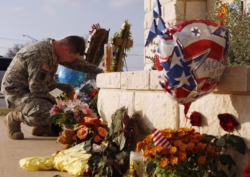‘God put me there for a reason,’ says Fort Hood chaplain
BRAINTREE -- Days before the recent shooting at Fort Hood, Texas, the base’s chaplain had a bad feeling.
“I had served in Iraq and Afghanistan and I never had that feeling before,” said Father Edward McCabe, the senior military chaplain there who is also a priest of the Archdiocese of Boston. “I just can’t describe it.”
While he said he did not specifically sense a violent attack was about to happen, he compared it to having an “instinct,” he told The Pilot in a telephone interview Nov. 10.
On Nov. 5, a gunman opened fire at the base, killing 13 and wounding 30. Authorities say Maj. Nidal M. Hasan, 39, a psychiatrist on the base, was the sole gunman. He was wounded, placed into custody, and hospitalized.
Father McCabe said that he spoke with Cardinal Seán P. O’Malley about his sense of foreboding while was recently back in Boston and both were attending an Oct. 30 event in East Boston.
“There was a hostile sense here that was surrounding me,” Father McCabe continued. “It was bothering me terribly. I told (Cardinal O’Malley) that. I said I think I have to resign.”
Ten days before the incident took place, Father McCabe said that “this heightened sense was enveloping me.”
His sermon that day focused on the prevalence of violence in modern society and how “our culture gravitates to violence.”
“I said I don’t subscribe to that and that’s not our Christian approach,” Father McCabe said.
Father McCabe recalled the events of the day.
He was ten minutes into a weekly chaplains’ meeting when the incident took place, just five minutes from his office.
“I was in the hospital 25 minutes after the incident,” Father McCabe said. “There were about 15 wounded there.”
Father McCabe also recalled returning to the crime scene.
“I was able to go to the door and look in. The crime scene had been secured so that the evidence couldn’t be contaminated,” he said. “Eight died in there, and one died on the lawn. Once the shooter had been subdued, out of respect they carried that body in and placed that body with the other eight.”
“All the floor was filled with blood,” he added.
Father McCabe said he prayed at the scene, and also felt a sense sudden nervousness.
“I had never seen this type of carnage before,” he said. “I said to myself, ‘Gee, I can’t allow such an evil display to control me.’ I immediately got a hold of myself again and finished the prayers.”
Once outside, he heard stories from bystanders and other civilians and soldiers on the base. Father McCabe said they recounted how the civilians and soldiers attempted to charge the gunman to take him down.
“There was this unbelievable act of heroism and courage by all sorts of soldiers and civilians who were in the processing center there,” Father McCabe said.
After the shooting, Father McCabe also visited the local army medical center, where he anointed two victims in surgery. Another, however, had died before he arrived. He then visited two victims who had been sent to a hospital in Austin because of the severity of their injuries.
After returning to the base, Father McCabe recalled beginning numerous interviews with international, national, and local media outlets after a 7 p.m. staff meeting.
During the interviews, Father McCabe said he put the events into a Catholic spiritual perspective. He explained that four of the deceased were Catholic. One victim was also pregnant.
“Even though the figure says 13, as far as I’m concerned, 14 were killed,” he said referring to the unborn child.
“In some of the interviews I did, I was intimating about how politically correct everything is, and I said in our society today, as far as I’m concerned, the family unit is under assault,” Father McCabe told The Pilot. “I said these problems develop because the family structure is weakened.”
Father McCabe also spoke about the prevalence of violence in our society.
“We cannot allow evil to control us,” he said. “Unfortunately, my question is, ‘is this incident a fluke incident, or is this indicative of our culture? Is our culture moving into a more violent form?’”
Father McCabe said that many soldiers had left the base over the weekend, but by Monday, there was a returned “sense of normalcy.”
He praised the dedication and mercy displayed by the medical professionals and the heroism and courage of the civilians and soldiers on the base that day.
“I had to take those two characteristics that I was observing and put it into a spiritual perspective that love and mercy are more powerful than violence,” Father McCabe said. “In the Gospel, it talks about lighting the lamp to dispel the darkness and so I said poetically (that) even in the darkness stars still shine. I have to try to view the event, even though the event was inexplicable, from a spiritual perspective.”
Looking back, Father McCabe now knows why he was stationed at Fort Hood.
“As a priest, I have to believe the Holy Spirit was leading me here for a reason, that God put me here for a reason. Now, in retrospect, I know why I came. But at first, I didn’t. While I was here, I was struggling against this,” he said.
Catholic News Service materials contributed to this story.



















